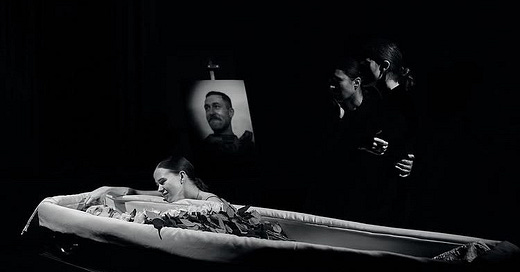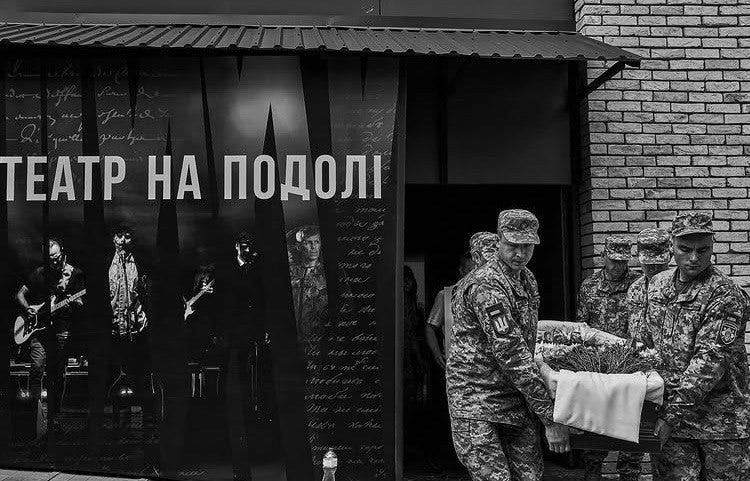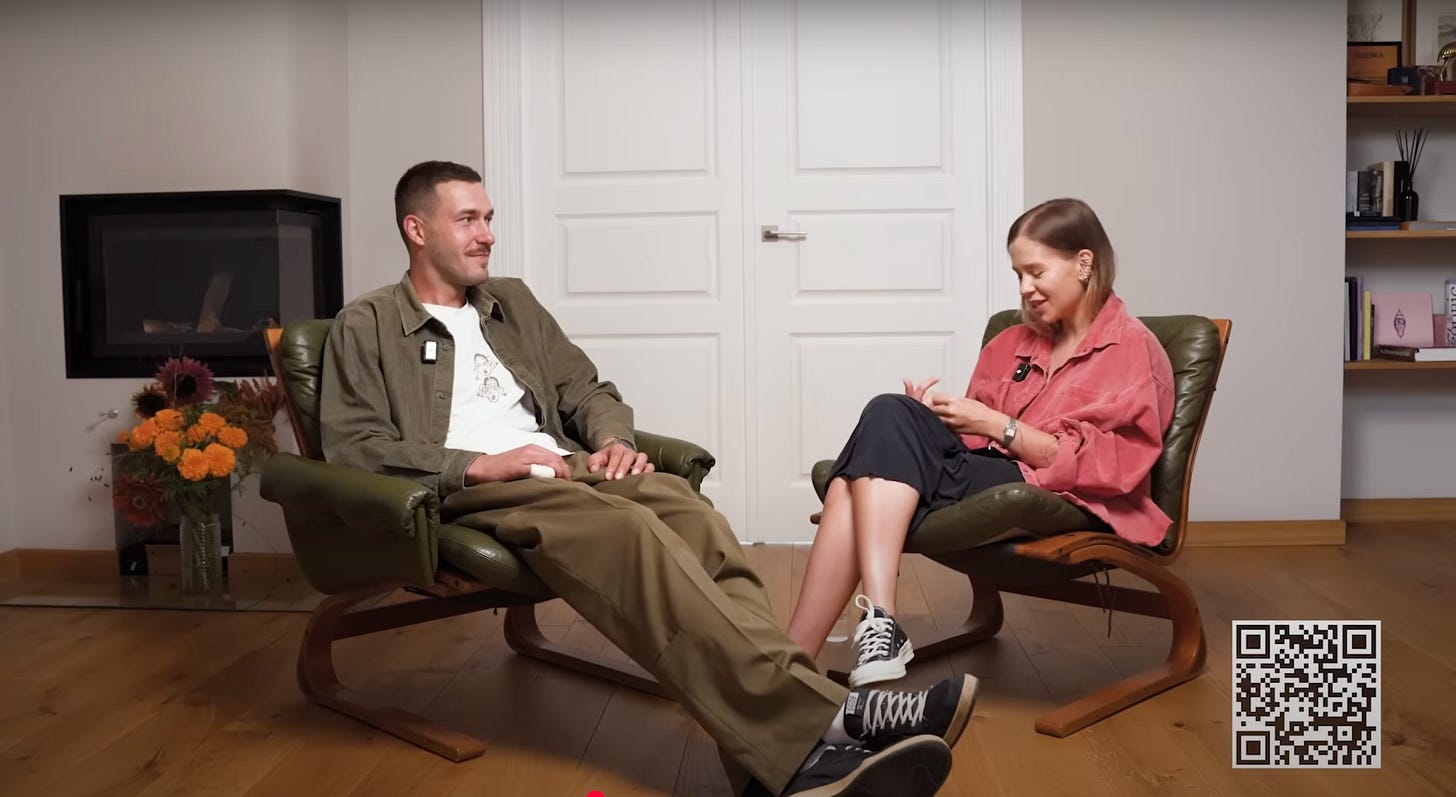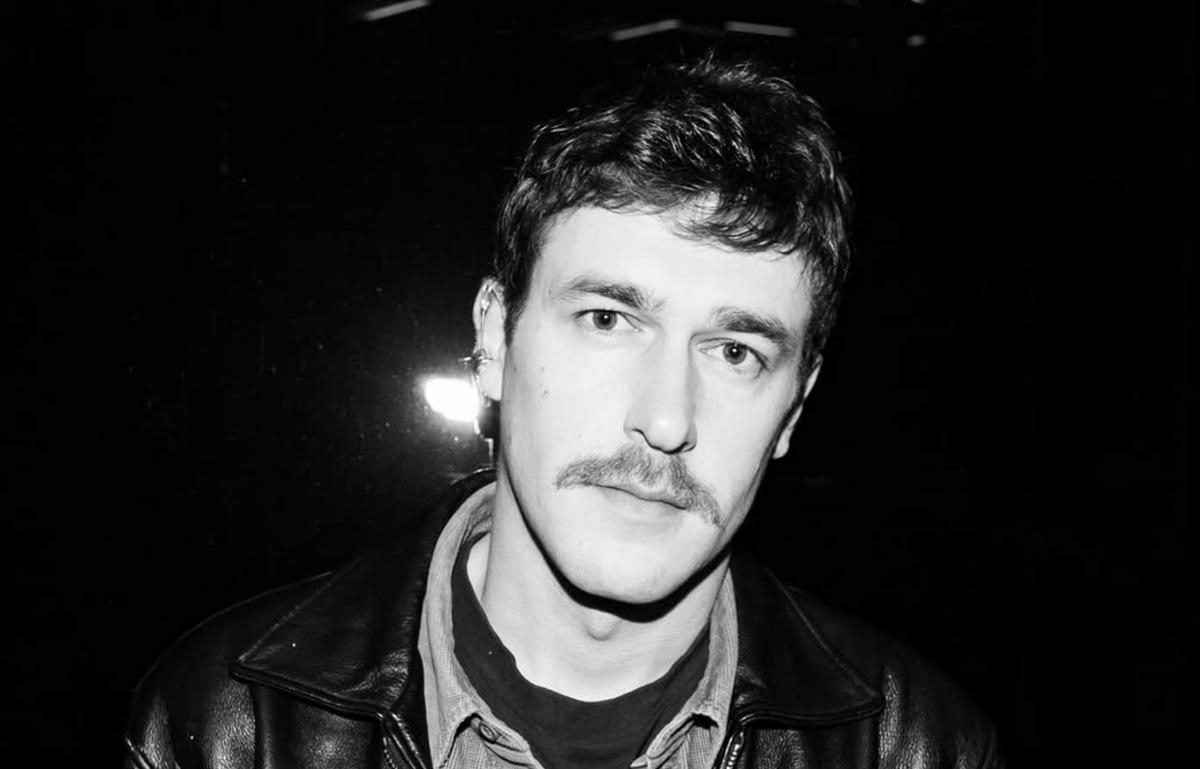Did you go to the funeral yesterday? I texted my friend who lives in Kyiv.
I wish I never wrote that message. No, I wish I never had to write it.
This Sunday, June 15, I opened my Instagram page in the hope of reading some of the “Happy Birthday” messages from my friends. Following the familiar impulse, I clicked on a random story, and a black screen popped up with white text written in capital letters: Yura zagynuv, Yura was killed. Funeral is scheduled for Friday. Someone dropped a glass vase on my head.
I never met Yuri Felipenko personally, but he never fully disappeared from my sight. He was a public figure in Ukraine — tall, gracious, charismatic, his appearance destined him to become an actor. He mostly played in theatre where I often went when I lived in Kyiv, sometimes starred in TV shows and movies.
He was also the husband of Kateryna Motrych, a Ukrainian public figure who’s been on my radar since around 2020. She is also a friend of my close friend, which made me feel the unusual proximity to a relatively distant person. She’s a host of a Ukrainian YouTube show called “About,” where young Ukrainian women gather to discuss issues ranging from gender equality to financial freedom. I’ve watched dozens of their episodes over breakfasts and dinners. Kateryna has often mentioned her boyfriend, then her husband Yura; he became an unseen figure, a shadow part of their conversations on love and partnership.
“We are partners; we do everything together,” she proudly said.
The show was also controversial to many; it habitually attracted hate comments from Ukrainians at home and abroad. The reason was simple: the women who hosted the show were considered “members of the creative class”, meaning — people earning way above the average wages in Ukraine, in thousands of dollars. And so they were accused of everything: of being out of touch with ordinary Ukrainians, of disregarding issues of people living in smaller Ukrainian regions and only talking through the lens of Kyiv, of being privileged and out of depth with normal life.
Even more so since the full-scale invasion: oh, you live a rich lifestyle in Kyiv, you’re shielded from war, you don’t understand what it’s like for the rest of us. And I will admit — I myself thought the show often failed to speak to all Ukrainians, to become universal instead of particular.
There was one episode I hadn’t watched. It’s been hanging in my “Watch later” playlist for months, titled “How the war (does not) change the relationships.” I started watching and hit on pause: it was Kateryna and Yuri, recording an episode about how his military service affected their family. In April 2024, Yura enlisted in the Ukrainian army, putting his career as an actor on pause. He underwent training with the Achilles Battalion, which specializes in drone warfare, and eventually started joining missions on the battlefield. Yuri shared his story of why he decided to join the army, while Kateryna talked about her attempts to adjust to a life without him — the partner who’s always been home, sharing responsibilities and domestic life with her.
His eyes were enthusiastic, his gaze was calm and clear:
- Why did you join the army?
- This is my mission, my contribution to the future of our country, to our family and our future children. I wouldn't want my children to go to war. In order to stop this now, we need people, we need an army, a strong military. That's why I made the decision to go.
I watched the interview 3 days after Yuri was killed. In fact, I was not alone — it started going viral on Ukrainian YouTube. Thousands of people were watching the same interview, flooding the comment section to commemorate Yuri and thank him for giving his life to protect us. The video has turned into a digital memorial, a collective space of mourning for all.
No one teaches you how to deal with the death of a person you’ve hardly known. The sense of loss is unclear, foggy, unfolding somewhere in the darkness. You don’t feel the right to mourn — after all, it’s not your life that’s been altered. Your life will keep going exactly as it did. And at the same time, this mourning is more earth-shattering than you could have ever suspected. There is so much loss that Ukrainians are experiencing every day, so much that it has lost meaning — numbers of dead, cities shelled, square meters taken. But then, suddenly, this loss has a face. For many in the last week, this loss acquired the face of Yuri Felipenko.
So while celebrating my birth, I mourned. And 3000 km away from Kyiv, I kept mourning. I found myself googling his name, again and again, reading every article mentioning him; looking at his pictures, looking at their pictures together; going through every account of people who were his friends. It was an almost manic urge — to see, hear, alive him, at least in my head. I tried to understand why his death felt so impossible.
Was it because of their family’s presumed “privilege” in the eyes of the public? Was it because he lived his life in public sight? Was it because he was so young and so impossibly charismatic, only 32 years old, an antithesis to death? Was it because he only joined the army a year ago, somehow disturbing calculations of time spent in the army being proportionate to the chance of being killed?
But his death was irrational. It offered no answers.
On Friday, I felt like I was missing the funeral. So I watched it just like I learned about his death, online. Many of the people I knew went and posted stories from the open military funeral held at St. Michael's Golden-Domed Monastery in Kyiv. The audience was so massive it seemed like the whole of Kyiv was there; something was unusual about that crowd. I didn’t realize what until someone titled the photo: “The young are burying the young.” Most of these shadows wearing black clothes and a scornful expression on their faces were my age.
On Friday evening, Ukrainian media started posting videos from the first part of the funeral service, held at Yuri’s theatre. Someone has recorded a part of Kateryna’s speech, half-speaking, half-crying:
I want you to know that he had a beautiful life. He went to fight voluntarily so that all of us could live here in peace. It was his conscious decision; he didn’t go there alone, but with his friends. And he served honestly and faithfully.
And I am ready to believe that there is at least some kind of heaven, just so that we can meet there later. (…)
I don’t blame anyone for this death except russia. I want to ask everyone who is here to kill off everything Russian inside themselves, to forget the language of the enemy, to forget they even exist, and to seek vengeance. Because it is only because of russia that we are gathered here today, looking at Yura’s cold body.
Glory to Ukraine.
In five days after his death, it would have been the anniversary of Kateryna’s and Yuri’s marriage. They would keep living in Kyiv, taking care of their two cats, going on to have kids Yuri so wanted to protect by joining the army. Yura would go on taking part in plays, movies, and TV shows, build an even more prolific career, support and contribute to the Ukrainian culture. He would age, perhaps even die from an old age.
But they killed him.
They killed him on my birthday.









💔
I, like you, was struck by what happened. Russia is taking the lives of our brothers, friends, and children. There are actors in my family; I know some of the actors in this theater. For them, it is a shock from the closeness of the loss. Thank you for expressing what I also felt when I learned about Yuri's death.